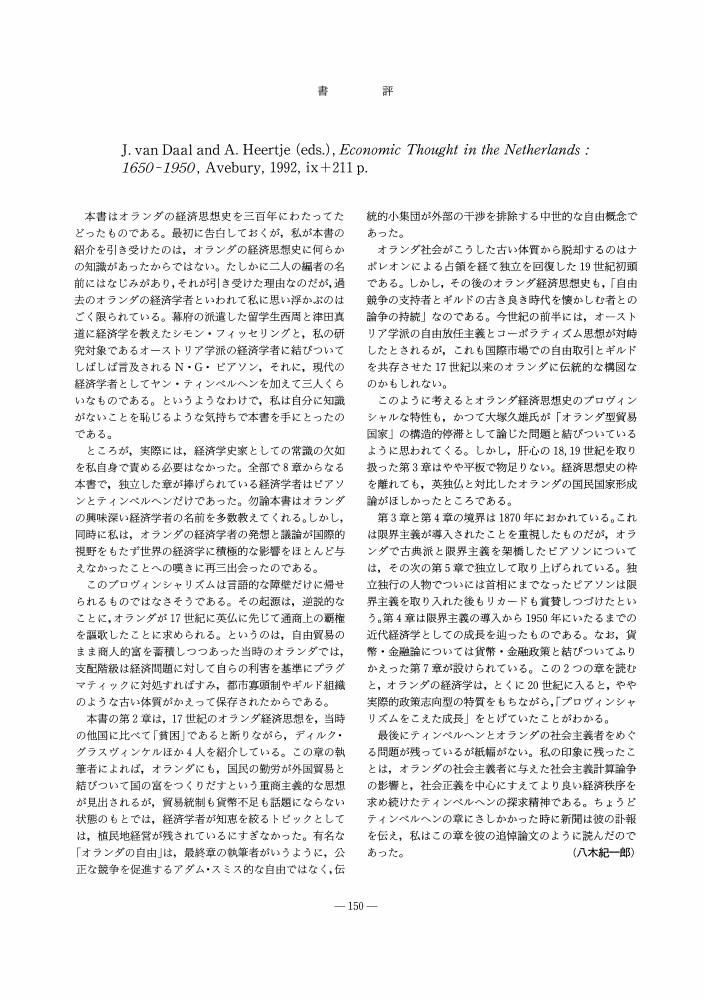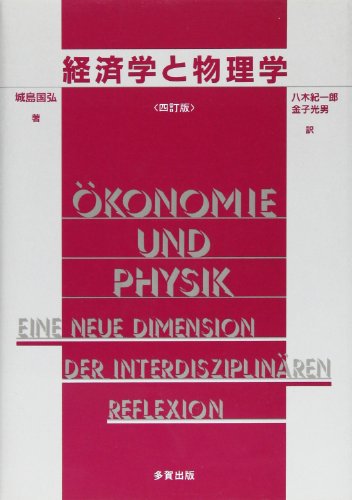32 0 0 0 OA 欧州地域政策における「ソーシャル・イノベーション」と「スマート・スペシャリゼーション」
- 著者
- 八木 紀一郎
- 雑誌
- 摂南大学地域総合研究所報 = BULLETIN OF SETSUNAN INSTITUTE OF REGIONAL STUDIES (ISSN:24239798)
- 巻号頁・発行日
- no.1, pp.5-28, 2016-02
19 0 0 0 OA 変異するダーウィニズム : 進化論と社会
4 0 0 0 IR "経済学の制度化"視角の提起するもの--経済学史学会関西部会の討論から
- 著者
- 八木 紀一郎
- 出版者
- 京都大學經濟學會
- 雑誌
- 経済論叢 (ISSN:00130273)
- 巻号頁・発行日
- vol.143, no.6, pp.p483-498, 1989-06
- 著者
- 八木 紀一郎
- 出版者
- 京都大學經濟學會
- 雑誌
- 經濟論叢 (ISSN:00130273)
- 巻号頁・発行日
- vol.143, no.1, pp.92-102, 1989-01
2 0 0 0 IR NAFTA のもとでの米墨国境経済:経済統合の(非)制度化
- 著者
- "八木 紀一郎" "ヤギ キイチロウ" Kiichiro" "Yagi
- 雑誌
- 摂南経済研究
- 巻号頁・発行日
- vol.1, no.1, pp.131-150, 2011-03
1 0 0 0 OA 玉野井芳郎「エコノミーとエコロジー」
- 著者
- 八木 紀一郎 チャペスキー ロバート 玉野井 芳郎
- 出版者
- The Japanease Society for the History of Economic Thought
- 雑誌
- 経済学史研究 (ISSN:18803164)
- 巻号頁・発行日
- vol.62, no.1, pp.51-75, 2020 (Released:2020-10-16)
- 被引用文献数
- 1
- 著者
- 八木 紀一郎
- 出版者
- The Japanease Society for the History of Economic Thought
- 雑誌
- 経済学史研究 (ISSN:18803164)
- 巻号頁・発行日
- vol.57, no.2, pp.122-123, 2016 (Released:2019-11-26)
1 0 0 0 OA Sugihara Shiro on Kawakami Hajime
- 著者
- 八木 紀一郎
- 出版者
- The Japanease Society for the History of Economic Thought
- 雑誌
- 経済学史研究 (ISSN:18803164)
- 巻号頁・発行日
- vol.54, no.2, pp.1-10, 2013 (Released:2019-08-22)
Abstract: In the last stages of his scholarly life, Sugihara Shiro (1920-2009) wished to collate his lifeʼs research on the history of economic thought in a four-volume work. The ti-tles of these volumes were descriptive of not only his area of research but also his peculiar viewpoint applied in those areas. In the first volume, which is on Marx, Sugi-hara essentially viewed the essence of economy in the “economy of time,” and appre-ciated Marxʼs unique insight of the dialectical relationship between necessary labor time and free disposable time. In the second volume, which is on John Stuart Mill, Sugihara considered Mill to be a sincere inquirer of human freedom, who anticipated the conditions of modern industrial society and mass democracy. The third volume deals with Kawakami Hajime, and the fourth volume, which was unpublished, is his investigation of modern Japanese economic thought using a bibliographical ap-proach. Kawakami Hajime (1879-1946) was a special figure in Sugiharaʼs life. This is because Sugihara grew up in the academia of Kyoto, where Kawakamiʼs influence still remained, and inherited Kawakamiʼs moralistic views. This is seen also in Sugi-haraʼs study of Marx and John Stuart Mill. In this essay, the author critically examines Sugiharaʼs new interpretation of Kawakamiʼs Bimbo Monogatari (Tales on Poverty) and suggests that the adoption of Marxism by Japanese intellectuals occurred under the influence of the Russian Revolution. In the authorʼs view, this historical context overshadows the work of sev-eral generations of Japanese intellectuals, including Sugihara. Kawakamiʼs moralist attitude did not change, even though he became a Marxist, and can be seen in his re-flections on religious truth and scientific truth during his prison years. When Sugi-hara called Kawakami a “Man on Voyage,” he seemed to be expressing his sympathy toward Kawakamiʼs quest for truth in the difficult years of the twentieth century. JEL classification numbers: B 14, B 51, N 35.
- 著者
- 八木 紀一郎
- 出版者
- 経済学史学会
- 雑誌
- 経済学史研究 (ISSN:18803164)
- 巻号頁・発行日
- vol.51, no.1, pp.101-102, 2009 (Released:2019-06-22)
1 0 0 0 OA 三田剛史『甦る河上肇-近代中国の知の源泉』藤原書店, 2003, 476頁
- 著者
- 八木 紀一郎
- 出版者
- 経済学史学会
- 雑誌
- 経済学史学会年報 (ISSN:04534786)
- 巻号頁・発行日
- vol.45, no.45, pp.113-114, 2004 (Released:2010-08-05)
- 著者
- 八木 紀一郎
- 出版者
- 経済学史学会
- 雑誌
- 経済学史学会年報 (ISSN:04534786)
- 巻号頁・発行日
- vol.40, no.40, pp.101-102, 2001 (Released:2010-08-05)
- 著者
- 塘 茂樹 八木 紀一郎
- 出版者
- 経済学史学会
- 雑誌
- 経済学史学会年報 (ISSN:04534786)
- 巻号頁・発行日
- vol.39, no.39, pp.181-183, 2001 (Released:2010-08-05)
- 著者
- 八木 紀一郎
- 出版者
- The Japanese Society for the History of Economic Thought
- 雑誌
- 経済学史学会年報 (ISSN:04534786)
- 巻号頁・発行日
- vol.39, no.39, pp.86-93, 2001 (Released:2010-08-05)
- 参考文献数
- 36
Historical research into Austrian economics was encouraged by two conferences in 1971 (Bellagio and Vienna) and one in 1989 (Durham, NC). Grounded on a thorough archival investigation, study of Carl Menger and Böhm-Bawerk has made a remarkable progress. Although study of Wieser is rare, we now have a good understanding of founding fathers of the Austrian school in the intellectual traditions of the Germanspeaking world. However, the theoretical research in this area shows a lag. A new general view of Austrians is still to come. One of the problems involved in this field of study is whether, Austrian' school is a branch of neo-classicism or not. In the last part of the survey, the author poses the question about the vision that guides historical reseach regarding the Austrians. His tentative answer is that a historical researcher need not adopt the same view as those of the economists he studies. The author suggests that an ‘evolutionary’ view might offer a better framework for the research than the ‘Austrian’ view could offer.
- 著者
- 八木 紀一郎
- 出版者
- The Japanese Society for the History of Economic Thought
- 雑誌
- 経済学史学会年報 (ISSN:04534786)
- 巻号頁・発行日
- vol.38, no.38, pp.205-206, 2000 (Released:2010-08-05)
- 著者
- 八木 紀一郎
- 出版者
- The Japanese Society for the History of Economic Thought
- 雑誌
- 経済学史学会年報 (ISSN:04534786)
- 巻号頁・発行日
- vol.34, no.34, pp.142, 1996 (Released:2010-08-05)
- 著者
- 八木 紀一郎
- 出版者
- The Japanese Society for the History of Economic Thought
- 雑誌
- 経済学史学会年報 (ISSN:04534786)
- 巻号頁・発行日
- vol.32, no.32, pp.150, 1994 (Released:2010-08-05)
- 著者
- 八木 紀一郎
- 出版者
- The Japanese Society for the History of Economic Thought
- 雑誌
- 経済学史学会年報 (ISSN:04534786)
- 巻号頁・発行日
- vol.29, no.29, pp.36, 1991 (Released:2010-08-05)
1 0 0 0 OA オーストリア学派の〈復活〉と歴史的オーストリア学派
- 著者
- 八木 紀一郎
- 出版者
- The Japanese Society for the History of Economic Thought
- 雑誌
- 経済学史学会年報 (ISSN:04534786)
- 巻号頁・発行日
- vol.24, no.24, pp.1-9, 1986 (Released:2010-08-05)
- 著者
- 八木 紀一郎
- 出版者
- 土地制度史学会(現 政治経済学・経済史学会)
- 雑誌
- 土地制度史学 (ISSN:04933567)
- 巻号頁・発行日
- vol.43, no.3, pp.1-9, 2001-04-20 (Released:2017-12-30)
Since the Thacher-Reagan-Nakasone Era of the 1980s, the liberal economic ideas of the 'Austrian School' have been on the tongues of politicians all over the world. For a deep understanding of this intellectual tradition, however, we must bear in mind that it has a history of more than one hundred years since Carl Menger published his seminal work, Grundsatze der Volkswirtshaftslehre. After a very short discussion on the methodology of intellectual history (Section 1), I explore the school's origins in the old Austria under the Habsburg Monarchy. I find that the most important development in this tradition was the emergence of a fundamental liberalism during the turbulent years after 1918 (Section 2). Ludwig von Mises was the sole innovator of this tradition. I examine Mises' position in Austrian post-war economic policy in Section 3, using evidence from his contemporaries as well as financial statistics. In Section 4, I summarize his criticism of socialism and defense of liberalism. In the last section, I conclude that Mises' fundamental liberalism was the expression of the dissipation of the social basis for a viable political liberalism in the unstable Austrian Republics. However, the purification performed by Mises provided the liberal ideas of the 'Austrians' with a new vigor that enabled them to migrate to the United States.
1 0 0 0 経済学と物理学 : 同型対応(イソモルフィー)による学際研究
- 著者
- 城島国弘著 八木紀一郎 金子光男共訳
- 出版者
- 多賀出版
- 巻号頁・発行日
- 1995











